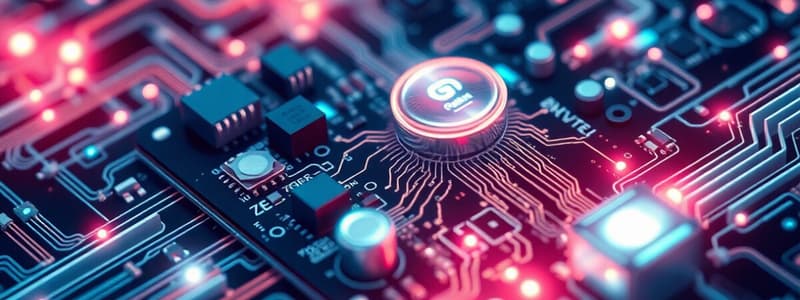Podcast
Questions and Answers
What is the term for the flow of electrons in a circuit?
What is the term for the flow of electrons in a circuit?
- Resistance
- Power
- Voltage
- Current (correct)
Which of the following describes Ohm's Law?
Which of the following describes Ohm's Law?
- V = I × R (correct)
- R = V - I
- P = V + I
- V = I / R
What do resistors primarily do in an electrical circuit?
What do resistors primarily do in an electrical circuit?
- Amplify voltage
- Store energy
- Allow current to flow freely
- Limit current flow (correct)
In a parallel circuit, what remains constant across each component?
In a parallel circuit, what remains constant across each component?
What is the main function of a diode in a circuit?
What is the main function of a diode in a circuit?
Which component is characterized by inductance?
Which component is characterized by inductance?
What do Kirchhoff's Voltage Law states about the sum of voltage drops in a circuit?
What do Kirchhoff's Voltage Law states about the sum of voltage drops in a circuit?
What is a characteristic of semiconductors?
What is a characteristic of semiconductors?
Flashcards
Electric Current
Electric Current
The rate of flow of electric charge, measured in amperes (A).
Ohm's Law
Ohm's Law
The relationship between voltage, current, and resistance: V = I × R.
Series Circuit
Series Circuit
Components connected end-to-end. Current is the same throughout.
Parallel Circuit
Parallel Circuit
Signup and view all the flashcards
Resistor
Resistor
Signup and view all the flashcards
Capacitor
Capacitor
Signup and view all the flashcards
Kirchhoff's Current Law
Kirchhoff's Current Law
Signup and view all the flashcards
Alternating Current (AC)
Alternating Current (AC)
Signup and view all the flashcards
Study Notes
Basic Electrical Concepts
- Electricity is the flow of electrons.
- Electric current (I) is the rate of flow of electric charge, measured in amperes (A).
- Voltage (V) is the electrical pressure that drives the flow of current, measured in volts (V).
- Resistance (R) opposes the flow of current, measured in ohms (Ω).
- Ohm's Law states the relationship between voltage, current, and resistance: V = I × R.
- Power (P) is the rate at which electrical energy is used, measured in watts (W). Power is calculated as P = V × I or P = I² × R or P = V² / R.
- Direct Current (DC) flows in one direction.
- Alternating Current (AC) periodically reverses direction.
- Conductors allow current to flow easily.
- Insulators impede current flow.
- Semiconductors have conductivity between conductors and insulators, essential in electronics.
Basic Electronic Components
- Resistors: Limit current flow. Various values and power ratings exist.
- Capacitors: Store electrical energy in an electric field. Characterized by capacitance (measured in farads).
- Inductors: Store energy in a magnetic field. Characterized by inductance (measured in henries). Inductance depends on the coil's physical characteristics.
- Diodes: Allow current to flow in one direction, crucial for rectification.
- Transistors: Act as switches or amplifiers, controlling current flow. Different types exist (e.g., bipolar junction transistors, field-effect transistors).
- Integrated Circuits (ICs): Complex combinations of transistors and other components on a single chip, enabling miniaturization and complexity.
- LEDs (Light Emitting Diodes): Emit light when current flows through them.
Circuit Analysis
- Series Circuits: Components are connected end-to-end. Current is the same throughout. Total resistance is the sum of individual resistances.
- Parallel Circuits: Components are connected across each other. Voltage is the same across each component. The reciprocal of the total resistance is the sum of the reciprocals of the individual resistances.
- Kirchhoff's Laws: Govern the behavior of current and voltage in circuits. Kirchhoff's Current Law states that the total current entering a junction equals the total current leaving. Kirchhoff's Voltage Law states that the sum of voltage drops around a closed loop equals zero.
Studying That Suits You
Use AI to generate personalized quizzes and flashcards to suit your learning preferences.
Description
Explore the foundational principles of electricity and electronic components. This quiz covers topics such as Ohm's Law, the difference between AC and DC, and the role of resistors, capacitors, and more in electrical circuits. Test your understanding of key concepts that are essential for anyone studying electrical engineering.




